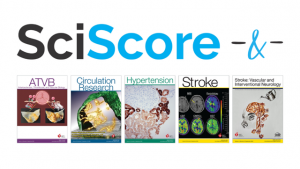
SciScore to check for adherence to rigor and reporting requirements in several American Heart Association journals
An earlier pilot project found that using SciScore to evaluate submitted manuscripts effectively improved several aspects of rigor of research articles.
SciScore, a product of SciCrunch Inc., provides authors and reviewers with both a score and a supporting report of the submitted manuscript to identify if key areas of reproducibility and transparency have been addressed or not in the manuscript. It will look for evidence of randomization, blinded conduct of the experiment, sample size estimation, whether sex is included as a biological characteristic, animal/cell line authentication or contamination, verify the identity of the antibodies used, and various other guideline-specific items.
SciScore, an automated and multifaceted tool based on artificial intelligence, evaluates scientific manuscripts for adherence to several key reporting criteria for rigor and reproducibility. To improve the reproducibility of the research published, SciScore is now integrated into the American Heart Association’s journal submission workflow. Results from the initial pilot, which ran over a year’s time for the Association’s Circulation Research journal, showed that the average monthly scores for submitted manuscripts rose dramatically by 4% month-over-month, which helped the journal to improve its rigor and reproducibility.
“SciScore helps editors point out the places where authors may have omitted a bit of detail about their study,” says Anita Bandrowski, CEO of SciScore. “I know that most researchers, when asked about methodological details, are happy to supply needed information. It is great that SciScore can alert authors and reviewers in advance where things might be missing. It is like spell check but for reagents.”
Moving forward, the following American Heart Association journals will have SciScore integrated in their journal submission process: Arteriosclerosis, Thrombosis, and Vascular Biology (ATVB), Circulation Research, Stroke, Hypertension, and Stroke: Vascular and Interventional Neurology.
Further reading on reproducibility crisis
• https://journals.plos.org/plosbiology/article?id=10.1371/journal.pbio.1002165
• https://blogs.scientificamerican.com/observations/to-fix-the-reproducibility-crisis-rethink-how-we-do-experiments/
• https://www.ahajournals.org/doi/full/10.1161/STROKEAHA.108.515957
Further results with SciScore
• https://www.nature.com/articles/d41586-020-00104-6 & https://www.biorxiv.org/content/10.1101/2020.01.15.908111v2
• https://www.jmir.org/2022/6/e37324
• https://www.csescienceeditor.org/article/4257/
Anita Bandrowski
SciCrunch Inc
+31 6 47947744
email us here
Visit us on social media:
X
LinkedIn
Other
Distribution channels: Book Publishing Industry, Healthcare & Pharmaceuticals Industry, IT Industry, Science
Legal Disclaimer:
EIN Presswire provides this news content "as is" without warranty of any kind. We do not accept any responsibility or liability for the accuracy, content, images, videos, licenses, completeness, legality, or reliability of the information contained in this article. If you have any complaints or copyright issues related to this article, kindly contact the author above.
Submit your press release
